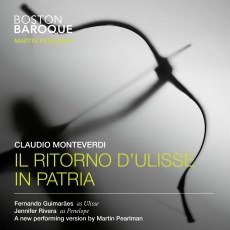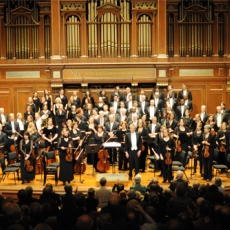Boston Baroque - Monteverdi: Ulisse - Andrew Benson-Wilson Blog
Monteverdi's 1640 Il ritorno d'Ulisse in patria is not as well-known as his Orfeo (1607) orL'incoronazione di Poppea (1643), partly because of the difficulties in preparing a performing edition from the rather scant surviving evidence. For this recording, made in the studio shortly after a semi-staged production in Boston in April 2014, Boston Baroque's director, Martin Pearlman, uses his own relatively conservative edition. As well as the orchestral ritornellos Pearlman has added a few orchestral colourings (using strings, cornetts and recorders) to the continuo line (of two theorbos, guitar, cello, two harpsichords, organ and an attractively buzzy regal). The use of instruments such as the cello (a later development from the bass instruments of Monteverdi's time) suggests a certain relaxing of strict instrumental authenticity, but this does not detract from an otherwise impression edition. There is a nice balance between the over-orchestrations of yesteryear and severely austere continuo-only interpretations. Indeed, one of the highlights is Pearlman's use of the various instrumental colours, with particularly effective contributions being made by the continuo theorbo players.
One of the problems of CD recordings of opera is that it is shorn of the visual and spatial input of a staging - the action and changes of scene must take place in the mind. It is obviously difficult to leave too big a silence between tracks but on this recording unrelated scenes are occasionally linked too closely. Perhaps a few continuo twiddles might have helped to suggest scenic transitions. Although the continuo instruments have a spatial stereo presence, the singers are generally aurally centre stage.
For much of the opera, the action and emotional content are a little underplayed, although there is a lively fight between Iro and Ulisse (in his disguise as an old beggar) and you can hear the three suitors' confidence sapping as they strain to bend the bow in Act 2. Things really come alive in Act 3, which opens with Iro's wonderfully declamatory O dolor, o martir, sung with relish by Marc Molomot. He had impressed earlier with the bucolic twang of his interjections into Eumete's insults (‘you glutton, you windbag' - Act 1/12).
One issue that is apparent from the start is the fact that too many of the singers seem unable to control their vibrato. They also frequently use vibrato instead of a proper early baroque trill. Jennifer Rivera (Penelope) and Fernando Guimaraes (Ulisse) both give fine performances in their emotionally wrought roles. Other key singers include Aaron Sheehan (Telemaco), Leah Wool (Minerva), João Fernandes (Il tempo & Nettuno), Marc Molomot (Ir0), Krista River (Ericlea), Abigail Nims (Melanto), Daniel Auchincloss (Eumete) and Christopher Lowrey (L'Humana Fragilità). The chorus only makes a brief appearances in Act 3 as a Choir in Heaven followed by a Choir of the Sea, sounding very distant, but also vibrato-laden.
The full libretto, with English translation, is given in the programme booklet, one quibble being that the track numbers are in a tiny and very faint light-green font which is almost impossible to read. As well as a triple CD version, this is also available in a wide range of download formats.

